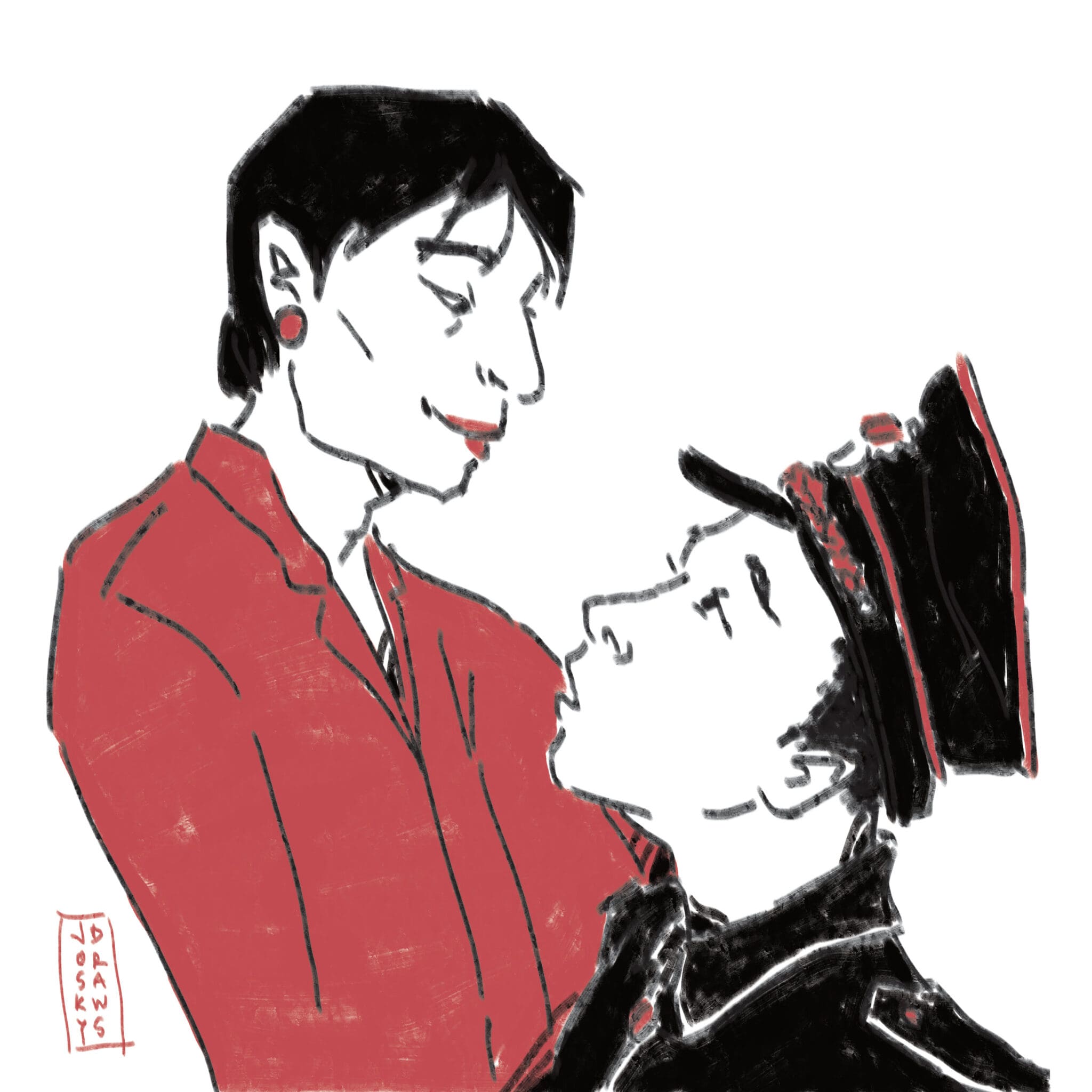Although queer cinema has been forced to exist underground in China due to political censorship, the exploration of identity and gender on screen has never ceased. For the Chinese queer community, which grew up under cultural and political oppression, the screen constitutes a weapon to fight against discrimination with images and pleasure.
Playing on themes of power, masochism, drag and sexual fantasy, East Palace, West Palace (1996) was one of the first radical and rebellious steps for Chinese queer cinema. Revolving around the interrogation and recollections of Alan, a cis gay man, after his arrest by Xiao Shi, a police officer, the film reveals the marginalisation and defiance of the Chinese gay community in the 1990s under bureaucracy and the heteronormative order.
As a gay man, Alan does not conform to traditional notions of ‘masculinity’. Instead, he is a slim man with a soft voice who was caught having sex with another man. It is these feminine transgressions that bring scorn and correction upon him. In response to heteronormativity, Alan’s linguistic resistance takes a form of confession; by recounting his experience as a homosexual, he denounces stigmatisation from Shi and consequently reconstructs an authentic discourse of queer life.
The relationship between Shi, representing the authority of the state, and Alan, who is marginalised, controlled and intimidated, is also an embodiment of the reality of the general aphasia of the queer community in China. When Alan changes into a dress and wig left behind by a previously-arrested transgender man during the interrogation and declares his prisoner-police sexual fantasies, the political power relations of the pair are reversed. Shi, as the masculine counterpart, becomes flustered, rather than sexually confident and authoritative. This scene alone powerfully dissolves fixed connotations of gender and identity, revealing the constructedness of both societal and gender norms.
Notably, the actor who plays Alan, Si Han, is gay in real life. Therefore, his character’s line, “I’m not despicable, I’m just like you,” also constitutes the first time that the Chinese queer community has been able to refuse its stigmatisation on screen.
However, as Chinese cinema seeks to increase queer acceptance and visibilities in mainstream culture, the radical expression of gender and identity in queer cinema gave way to more romance.
From Happy Together (1997) to Lan Yu (2001), these narratives instead follow a stereotypical (traditionally heterosexual) love story template of tribulations and love. Gender identity is downplayed; experiences and meanings of queer identity are no longer the focus of the narrative. Although decentring queerness in these stories arguably creates a common ground with the heterosexual majority, it paradoxically conforms and reinforces the legitimacy of the heteronormative order. This in turn further marginalises the exploration of queer identity in film.
Nevertheless, the Chinese queer community’s on-screen resistance is far from over and even extends beyond. The film A Dog Barking At the Moon (2019), a direct discussion of the condition of queer people in rural China in the 1980s, won the Teddy Award at the 2019 Berlin Film Festival. When asked to censor scenes for screening qualification back in China, director Xiang Zi refused and released the film in full length on social media.
“I hope my country and government will one day understand that one can love anyone without censorship,” said a defiant Xiang.
For over 20 years, Chinese queer cinema has been through trials and silencing, but its defiance on and off-screen still echoes beneath the iron curtain of Chinese political censorship.
Mandarin Translation:
《东宫西宫》——荧幕上的反抗
虽然时至今日,酷儿影像在中国电影审查制度下只得以“地下电影”的形式存在,但荧幕上对身份与性别的探索却从未停止。因为,对于生长于文化与政治的压迫下的中国酷儿群体而言,荧幕恰好构成了他们以影像与愉悦来反抗歧视的武器。
以权力、受虐、变装、性幻想为主题的《东宫西宫》(1996)为中国酷儿电影迈出了激进与反叛的第一步。围绕着男同性恋者阿兰被警察小史逮捕后的审讯和回忆展开,这部电影揭示了90年代中国同性恋群体在官僚主义和异性恋秩序下的边缘化与反抗。
作为生理性别的男性,阿兰不符合传统的 “男性气质 “规范。相反,他是一个纤细与柔弱的男性,在公园与同性交欢时被当场逮捕。而也正是这些女性化的举止让他成为众矢之的。为了回应异性恋霸权,阿兰用自白的形式进行语言上的反抗;通过诉说他作为同性恋者的经历,他拒绝了小史对他身份的污名,并由此重新构建了一个真实的酷儿话语。
影片中,代表国家权威的小史和被边缘化、控制与恐吓的阿兰之间的关系,也是对中国同性恋群体普遍失语的现实写照。而当阿兰在审讯时换上之前被捕的跨性别犯人所留下的衣服和假发,并宣布他的囚犯-警察性幻想时,权力关系被颠覆,作为男性气质象征的小史反而变得慌乱与不知所措。仅仅这一幕就有力地消解了性别和身份的固定内涵,这反过来又向观众揭示了社会和性别规范的构建性。
更值得一提的是,饰演阿兰的演员司汗本身便是一名同性恋。因此,那一句“我不贱,我和你一样”,更是中国酷儿群体第一次在荧幕上掷地有声地拒绝对自己的污名化。
然而,随着越来越多的电影希望提高酷儿群体在主流文化中的接受和可见度,酷儿电影中对性别和身份的激进表达则开始逐步让位于浪漫爱情。
从《春光乍泄》(1997)到《蓝宇》(2001),这些电影的爱情叙事都刻板地遵循了一个有关磨难与真爱的异性恋爱情故事模版。性别与身份的讨论被淡化,酷儿身份的经历和意义不再是叙事的重点。尽管对爱情故事中酷儿性的淡化为酷儿群体与异性恋主流大众间建立起了可供交流的平台,但它又矛盾地认同并强化了异性恋秩序的合法性,将酷儿身份的探索置于更加边缘的境地。
尽管如此,中国酷儿群体在荧幕上的反抗远远没有结束,甚至延伸到了荧幕之外。2019年,直面80年代中国乡村酷儿群体状况的《再见,南屏晚钟》(2019)获得了柏林电影节的泰迪熊奖。当被要求删减影片以获得国内放映资格后,导演相梓将完整的电影上传到了网络上。
“我希望我的国家和政府有一天可以明白,一个人是可以爱任何人的。”相梓说道。
20多年来,中国的酷儿电影或许经历非难,但他们在荧幕内外的反抗依然在中国政治审查的铁幕之下回响。





